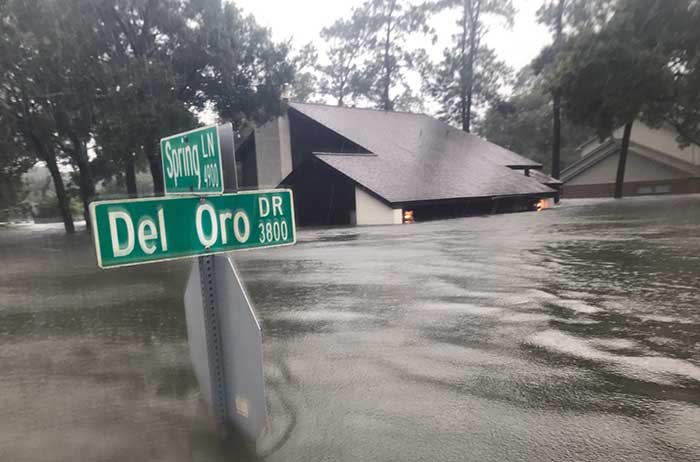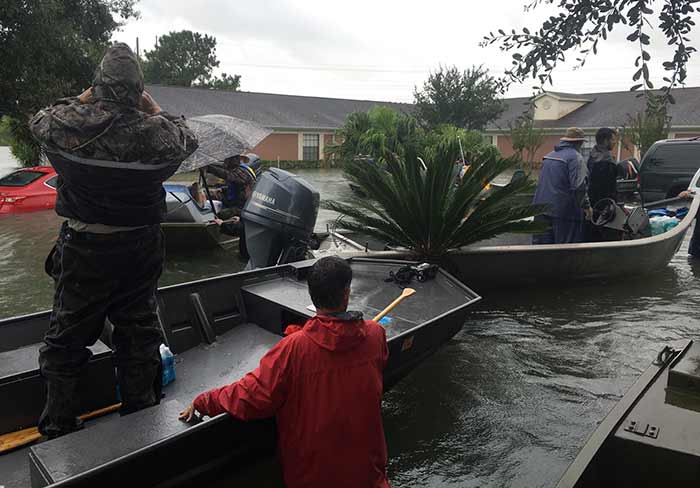Advertisement
Hundreds of recreational boaters volunteered their boats and expertise to personally evacuate thousands of people stranded from the massive flooding that overwhelmed the Houston, Texas area as a result of Hurricane Harvey.

Photo: Thomas Peters
Gunner Waldmann, a licensed boat captain and safety consultant in the gas and oil industry, lost his home last year to torrential rains in Abbeville, Louisiana. In 2005, he was among the all-volunteer boat brigade that rescued people after Hurricane Katrina caused epic flooding in New Orleans.
So when his fishing buddies Mike Plack, and surgeon J.J. Tabor called him to mobilize for the flooding from Hurricane Harvey in Houston, he didn't hesitate to go all in.
"Random people helped me when I was in need, and I felt compelled to give back," Waldmann explains.
The trio loaded gear onto his trailered 18-foot custom aluminum flatboat (or jon boat), the same one he had used 12 years earlier in the aftermath of Katrina, and within hours they were headed west into torrential rains and what would eventually be seven days of life and death rescues.
At 60, Waldmann has a lifetime of boating skills under his keel, including time as a field agent for the Louisiana Wildlife & Fisheries, but Katrina taught him what to expect in Houston. As he approached the Texas state border, his truck and boat trailer were buffeted by tropical force winds. The volunteers were far from alone.
Loosely organized groups of boaters, who have adopted monikers such as the Cajun Navy and the Texas Admirals mobilized as great swaths of Texas succumbed to floodwaters. Unlike post-Katrina rescues, these groups use a more sophisticated social media community for better coordination.

Another Houston volunteer is Thomas Peters. Normally, he runs fishing charters out of Venice, Louisiana, but those quickly dried up when Harvey came calling in the Gulf of Mexico.
"Having gone through Katrina, everyone down here knew what was coming next," Peters says. "With my knowledge of boats and access to the right gear, we hit I-10 for what is normally a five hour drive."
As he and some friends launched a flatboat, built for duck hunting in marshy southern Louisiana, into the floodwaters from a Walmart parking lot in Dayton, Texas, Peters joined a long line of American boaters rising up to provide assistance during a time of national distress or war.
"We convoyed to Houston from Baton Rouge with a group of about 30 to 40 boats, but by the third day, there were hundreds," he says. "There were boats trailered in from as far away as Arkansas, South Carolina and even a boat crew from Wisconsin."
Among the dozens of rescues, he took part in, one in particular stood out.
"We were dispatched by the Dayton Fire Department to evacuate a nursing home that was inundated. Due to the special needs of these elderly people, these rescues were especially difficult," says Peters.
With many of these patients bedridden or wheelchair bound, it wasn't as simple as placing a lifejacket on them and finding room on the boat. Peters describes the entire experience as organized chaos.
"One elderly lady had to be transported in her bed, which was then stabilized on a larger flatboat. They all were sent with their meds and medical histories," he explains. "What we didn't know is what exactly to do with them. We couldn't simply drop them off on high ground to fend for themselves. We were responsible for them."
As they drove the loaded boat back to the rally point in the parking lot, Peters was thrilled to discover that the local sheriff had put out a call for more volunteers and there were hundreds of people waiting to receive their passengers. Within 45 minutes, the entire nursing home had been evacuated.
South of Dayton, in Dickinson, Waldmann was operating separately from his friends and now had a sheriff's deputy onboard providing crucial local knowledge of the submerged city. Operating in 20- to 30-mph winds coming through with seemingly never-ending squall lines, Waldmann describes their methodical work.

"We were going house to house to house in about three feet of water throughout these subdivisions and didn't stop for 20 hours straight," he says. "At 18 feet, my boat is a custom hull but surprisingly roomy and we could take out around 10 people at a time. In one home with an S.O.S. taped up in the window, we had to break through a front window and found an elderly couple sleeping on their kitchen counters."
For seven days, Waldmann and his friends worked through the towns of Dickinson, Humble and Vidor, going where directed by local officials and dispatches coming through on the Zello app that essentially turns cell phones into walkie-talkies. All told, he conservatively estimates that he brought more than 500 people to safety.
"You have to be completely self-sufficient in these situations, providing your own fuel and water. I subsisted off a single bucket of fried chicken and cheese crackers for days, but eventually a group of four little old ladies set up at our rally point and started cooking huge pots of chicken and sausage jambalaya for everyone — evacuees and first responders alike — and more followed," he says. "The outpouring of support and volunteers was amazing."
Now home safely in his rebuilt house, Waldmann remains proud that he could use his boat skills to help those in need.
"I knew exactly what these people were feeling. Having lost everything they had ever worked for, hungry, wet and scared. I can identify with them," he says. "But it wasn't just me, there were hundreds of us who saw a need and knew we could help."
In quiet moments, he says he sometimes still tears up at what he experienced.
"Every night since, I have nightmares and I relive it," he says. "I can see the faces of the children on my boat. Every night they come back to me."
